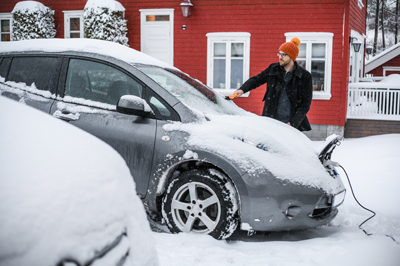Many owners of EVs worry about how effective their battery will be in very cold weather. A new battery chemistry may have solved that problem.
In current lithium-ion batteries, the main problem is the electrolyte is a liquid that begins to freeze at sub-zero temperatures. This condition severely limits the effectiveness of charging electric vehicles in cold regions and seasons.
To address that problem, a team of scientists from the U.S. Department of Energy’s Argonne and Lawrence Berkeley national laboratories developed a fluorine-containing electrolyte for sub-zero temperatures. This anti-freeze electrolyte shows promise of working for not only batteries in EVs, but also in energy storage for electric grids and consumer electronics like computers and phones.
In testing with laboratory cells, the team’s fluorinated electrolyte retained stable energy storage capacity for 400 charge-discharge cycles at -4 degrees Fahrenheit. Even at that sub-zero temperature, the capacity was equivalent to that of a cell with a conventional carbonate-based electrolyte at room temperature.
The team also determined at the atomic scale why their electrolyte composition worked so well. It depended on the position of the fluorine atoms within the molecules in the electrolyte transporting lithium ions and the number of those atoms.
“Our research thus demonstrated how to tailor the atomic structure of electrolyte solvents to design new electrolytes for sub-zero temperatures,” said Zhengcheng (John) Zhang, a senior chemist and group leader in Argonne’s Chemical Sciences and Engineering division.
The antifreeze electrolyte has a bonus property. It is much safer than the conventional electrolyte, since it will not catch fire.
Source: Argonne National Laboratory










Abby Andrews